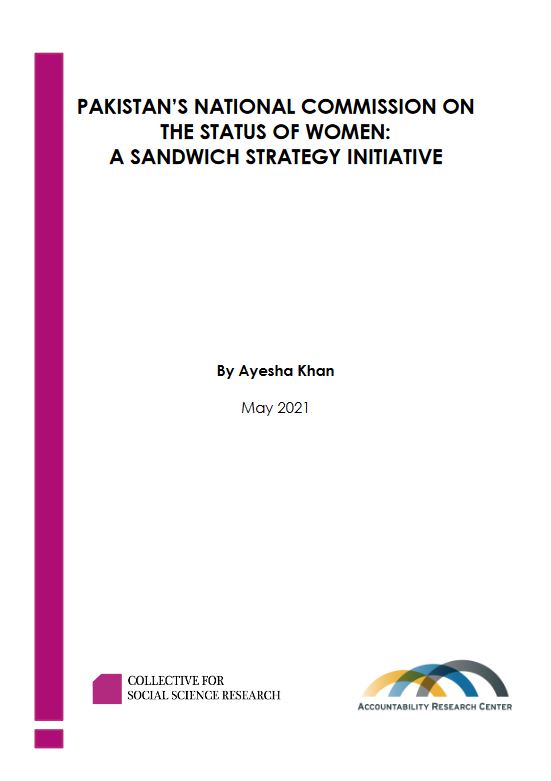
Pakistan's National Commission on the Status of Women: A Sandwich Strategy Initiative
Date: May 2021
Author(s): Ayesha Khan
Publication type:
Published by: Collective for Social Science Research and Accountability Research Center
“Sandwich strategies” are interactive processes in which reformers in government take tangible measures that reduce the risks of citizen action from below, driving virtuous circles of mutual empowerment between pro-accountability actors in state and society. This case study is one of a set of 18 published here, which are among those included in comparative analyses of whether and how sandwich strategy initiatives drive institutional change.
Pakistan’s National Commission on the Status of Women (NCSW) was an outcome of the women’s movement struggle for gender equality and continues to support their demands for gender justice. It is a compelling case study of a sandwich strategy initiative in which pro-reform actors within government cultivated synergy with citizen stakeholders to drive institutional change such as legislative and policy reforms for women’s rights. NCSW successfully built coalitions bringing together dedicated bureaucrats, concerned politicians, and strategic government bodies to work for reforms and reduce the risks of collective action for civil society activists.
This case study focuses on two initiatives where NCSW acted successfully to mediate and reinforce the interaction between pro-reform actors within the state and society. The first was NCSW’s role in building parliamentary support for the 2006 reform in Pakistan’s controversial zina laws, which ban all sex outside of marriage. The second was NCSW’s role as petitioner in a successful bid to ban jirgas, or tribal councils, which have a role in honor killings and illegal practices such as the exchange of girls in marriage to settle tribal disputes.
When its initiatives were successful, the NCSW was led by seasoned activists who used their leadership, experience, and convening power to draw on support from feminist groups to achieve policy reforms. Yet political and bureaucratic constraints to NCSW’s effectiveness remain. These undermine its ability to build coalitions for further progress on gender rights and to mitigate the risks for activists and women on the ground when they organize for change.
Ayesha Khan is Senior Researcher at the Collective for Social Science Research, based in Karachi. Her work covers a range of issues, in particular gender and development, social policy and conflict/refugee issues in the region. She has extensive experience in qualitative research design. She has also worked as a journalist and been active in the women’s movement in Pakistan.
